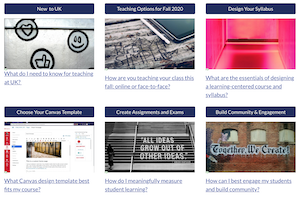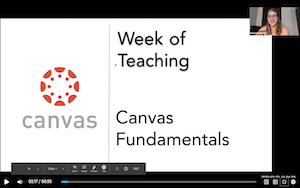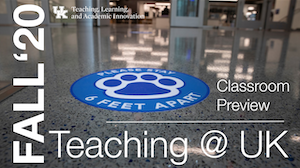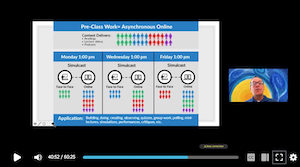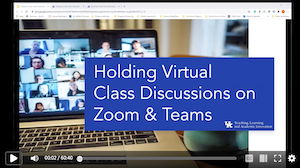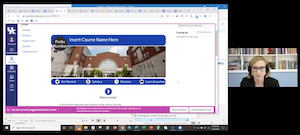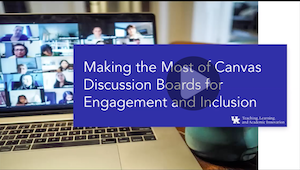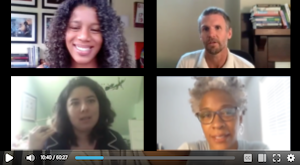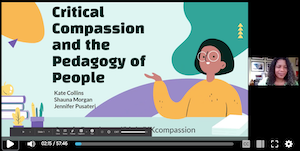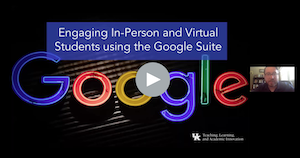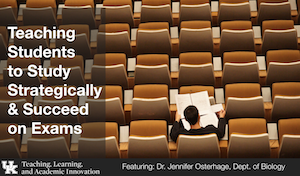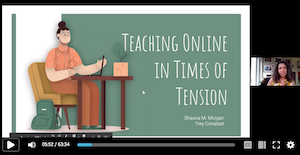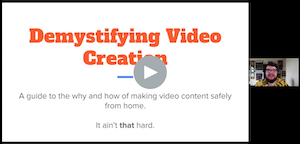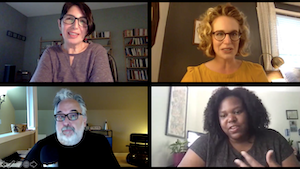Teaching, Learning, and Academic Innovation hosted two week-long virtual symposia during April and July 2020. The first was designed to support instructors' transition to emergency remote instruction into the summer term, and the second was designed to engage the critical aspects of teaching during the fall semester with in-person, hybrid, flexible, and remote instruction. Covering topics from the technical to the teacherly, the sessions for both symposia may be accessed below, along with other materials and resources.
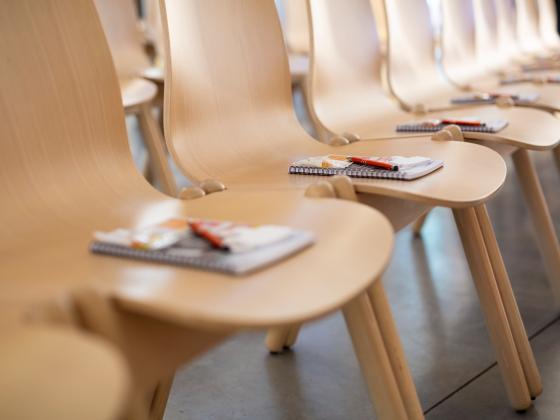
Virtual Symposium Week of Teaching Sessions, Materials, & Resources
July Sessions & Materials
Companion Canvas Resource
Our companion Canvas resource course is designed to complement the Week of Teaching's live sessions and to provide an ongoing (and growing) resource to support you wherever you are in the process of designing and teaching your fall semester classes. If you are a new instructor to UK, we invite you to start with our first module, "New to Teaching at UK." If you have questions about modes of course delivery, we invite you to start with the second module, "Choosing your Mode of Delivery." You may start wherever you feel you need the most help or work your way through. We've added questions under each module to help guide you if you feel lost. Click here to join the course!
Pre-Symposium Session: Canvas Fundamentals
Our pre-symposium session introduces the functions of Canvas for those who are new to the platform, as well as those who would like a refresher before the fall semester. Especially because students will be shifting from in-person to remote learning (and back again) throughout the semester, clearly organized and robust Canvas shells will cut down on confusion, allow students to focus more on learning, and save instructors a lot of time. This session covers the essentials of the interface, as well as how to use modules, communication tools, discussion boards, assignments, pages, media, and grading/gradebook functions. View the session here!
Classroom Preview: Virtual Tour
With images and video from UK PR and Marketing, this slide show examines a large lecture hall, a smaller classroom, and a new makeshift classroom in the Gatton Student Center ballroom. View the slideshow here!
Hybrid? Flexible? Synchronous? Not? Choosing the Best Modes of Course Delivery
The options for course delivery can be unfamiliar and overwhelming. Moreover, a course may use more than one delivery mode to best meet the needs of students and the goals of the course. In this session we will explore and visualize the major modes of delivery, with practical advice about how they can work for your courses, in your disciplinary context. We will cover asynchronous (self-paced) online, synchronous (live) online, simulcast with alternating in-person attendance, flipped with alternating in-person attendance, and hybrid with alternating in-person attendance. View the session here!
Further Reading and Resources
Holding Virtual Class Discussions
For so many of us, talking through ideas, questions, problems, processes, and reflections forms the bedrock of learning in our fields. Yet, alternating attendance models and online-only delivery seem to challenge our ability to engage students conversationally in real time. In this session we will show how UK’s videoconferencing platforms allow for robust and flexible discussion formats that can engage students across a range of delivery modes. Topics include setting expectations and structuring activities, modeling inclusive and equitable practices, managing large and small groups, and taking advantage of key features of videoconference platforms. View the session here!
Further Reading and Resources
- "How to Make Your Virtual Discussions Engaging, Effective, and Equitable"
- "How to Hold a Better Class Discussion"
- "Why is Zoom So Exhausting?"
- "8 Ways to Be More Inclusive in Your Zoom Teaching"
- "10 Tips for Effective Online Discussions"
- Discussions as a Way of Teaching: Tools and Techniques for Democratic Classrooms
Organizing the Course to Enhance Learning & Support Students in Multiple Settings
Students will have schedules this fall like never before. Some classes will meet online at specific times, others not. Some classes will alternate when the student attends in person. Homework, assignments, and other activities will have deadlines scattered across these different delivery modes and expectations. A well structured course will help students navigate the semester with much less confusion, frustration, and anxiety. It allows them to use their energy to focus on what really matters for the learning goals. In this session, we will share tools and templates that can make your course organized in terms of both the conceptual design and the Canvas layout. View the session here!
Making the Most of Canvas Discussion Boards for Engagement and Inclusion
There are many ways to engage students in productive and inclusive discussions, and the Canvas discussion board offers an easily accessible, flexible space for students to think through ideas, questions, problems, reflections, etc. with each other. We may have experienced “dud” discussion board activities in the past, but in this half-hour lunchtime session we will discuss ways of facilitating active, collaborative, and meaningful interactions via textual, audio, and video posts. View the session here!
Further Reading and Resources
Faculty Roundtable: The Practice of Inclusion & Equity in Teaching
A discussion between members of our teaching community, this conversation will focus on the experiences and values, both personal and professional, which move instructors to seek and practice inclusive and equitable pedagogy. Panelists will also share how the pandemic and movement for racial justice will impact their pedagogical approaches in the online, hybrid, and in-person classrooms. View the session here!
- Dr. Shauna Morgan, CELT & Teaching, Learning, & Academic Innovation (moderator)
- Dr. Ryan Crowley, Dept. of Curriculum & Instruction, College of Education
- Dr. Frances Henderson, Dept. of Gender & Women’s Studies, College of Arts & Sciences
- Dr. Kyra Hunting, School of Journalism & Media, College of Communication & Information
Critical Compassion & The Pedagogy of People
What does trauma look like? How might it affect the learning environment and the people within? This case-study based workshop will consider the ways that stressors shape learning and explore ways that we can practice a pedagogy of compassion. View the session here!
Further Reading and Resources
Engaging In-Person & Remote Students with the Google Suite
Beyond Canvas and Zoom, the Google Suite offers a range of apps for engaging students who are both physically present and remote, participating in both live and self-paced activities. All faculty, staff, and students have access to a UK Google account via the UK Account Manager’s email tab. Google apps can facilitate a variety of active and collaborative learning, from quick exercises to sustained projects. This session will examine how Docs, Forms, Jamboard, Sites, and Slides can enliven coursework and enhance learning across delivery modes and disciplines. View the session here!
Further Reading and Resources
Thinking Creatively About Assessments
Beyond their allowance as a way for instructors to evaluate students’ learning, assessments offer a variety of forms, modes, and genres for students to express and gain knowledge. One of the silver linings of the fall semester may be that its novelty leads us to take no decision as a given for our teaching, and this includes the assessments that we build into our course designs. This session will consider ways of making assessments as meaningful as possible for students, as well as best practices for setting students up for success in an unfamiliar and uncertain semester. View the session here!
Further Reading and Resources
- Transparent Design in Higher Education Teaching and Leadership (intro available as PDF download)
- TILT Higher Ed Examples and Resources
- "Getting Creative With Course Assessments"
Teaching Students to Study Strategically & Succeed on Exams
Given the complexities of course delivery and life on (and off) campus during the fall semester, it will be more critical than ever that students cultivate effective learning practices. In this informal conversation with Dr. Jennifer Osterhage (Dept. of Biology, College of Arts & Sciences) about her research on calibration, study practices, and student success in introductory biology, we will explore evidence-based perspectives on students’ self-perceptions, as well as ways that instructors can intervene to lead students to practice more strategic and reflective study habits. View the session here!
Further Reading and Resources
Designing Effective Questions for Quizzes & Exams in Hybrid, Flexible, & Remote Classes
Quizzes and exams offer a critical opportunity for students to demonstrate their progress towards learning goals, and for instructors to evaluate that performance for both formative and summative purposes. Yet, how we ask questions on these assessments can make a big difference for both student learning and our own labor as instructors. This resource will explore ways of designing questions along a spectrum of learning outcomes, evaluating the efficacy of questions as ways of assessing student learning, taking advantage of Canvas functions such as question banks and randomization, and designing assessments that disincentivize academic dishonesty. Access the resource here!
Teaching Online in Times of Tension
The virtual classroom environment offers its own challenges to belonging and inclusion, particularly when instructors are fostering a climate where students can openly discuss and debate potentially heated topics. This workshop will engage participants in a dialogue about pedagogical approaches to foster inclusion in an online environment with a specific focus on practices that allow a space for challenging conversations. View the session here!
Demystifying Video Creation
Just as the word processor made us into our own copyeditors, instruction in flexible, hybrid, and remote formats has made us into our own video producers. At first glance, this proposition can seem intimidating, as if we have to gain another literacy and skill set. However, this session will review quick and easy ways to create quality, accessible video content using freely available platforms for UK faculty, staff, and students. In particular, we’ll explore how to leverage the Yuja platform, UK’s video hosting service, as well as other software for recording lectures, screencasts, commentary, and feedback. Whatever the production level, video can enhance student learning in all course modalities. View the session here!
Further Reading and Resources
- Michael Wesch on Instructional Video: 10 Tips & Recording Effective Microlectures (5:50-12:30)
- Lighting for Video in Your Home Office
- Tutorial: Adding & Editing Captions in Yuja Videos
- Tutorial: How to Overlay Images in Video Using Adobe Premier Pro
April Sessions & Materials
Design the Syllabus & Choose Modes of Delivery
How do we design a syllabus for the summer term that will help students succeed? And, what are the best modes of delivery and engagement: synchronous, asynchronous, a blend? In this session we will engage the critical design considerations to set faculty up for the greatest success before getting into the nuts-and-bolts of building it all out online.
Organize the Class to Enhance Learning
A well structured online course helps students navigate the digital classroom without confusion, frustration, or anxiousness. It allows them to use their energy to focus on what really matters for the learning goals. In this session, we will share tools and templates that can make your course organized in terms of both the conceptual design and the Canvas layout.
Engage Students & Create a Class Community
We might be teaching remotely, but our classes can be engaging with a rich community experience. In this session we will explore how to promote student engagement in the online space, as well as how to create an inclusive community of learners that enhances students' sense of potential and belonging.
Assess Learning in Meaningful Ways
The online environment poses a unique opportunity to rethink how we effectively evaluate our students’ learning. In this session we will discuss how we can use the strengths of an online environment to our advantage when crafting meaningful assessments from a range of options.
Create Effective Media & Content from Home
Whether you are using a little media or a lot, developing quality content can enhance your presence, messaging, and impact on student learning. In this session we will introduce how you can create great media—effectively and efficiently—from the comfort of your home.
Plenary Panel: Engaging & Supporting Students in a Time of Pandemic
Our faculty plenary panel discussed a range of issues relating to ways of engaging and supporting students during an unprecedented time of pandemic and remote instruction. In addition to particular instructional strategies and perspectives, the panel considered the larger impact on the teaching mission of higher education.
- Dr. Cristina Alcalde, Professor of Gender & Women's Studies & Associate Dean in the College of Arts & Sciences
- Dr. Regina Hamilton, Assistant Professor of English
- Dr. John Nash, Associate Professor & Chair of Educational Leadership
- Dr. Jennifer Osterhage, Assistant Professor & Director of Undergraduate Studies in Biology
- Trey Conatser (moderator), Associate Director of the Center for the Enhancement of Learning & Teaching
